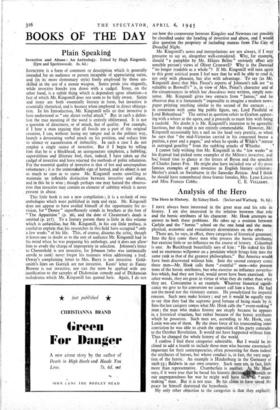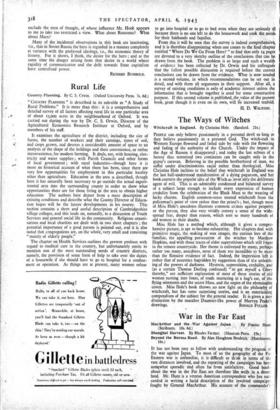Analysis of the Hero
The Hero in History. By Sidney Hook. (Seeker and Warburg. 8s. 6d.) I' HAVE always been interested in the great man and his role in history. I am also interested in the relation between 'that rote• and the heroic attributes of his character. Mr. Hook attempts an answer to both these problems. He takes up a position between Carlyle and the " heroic " school on the :one hand and the meta. physical, economic and evolutionary determinists on the other.
There are, he says, in effect, three categories of historical greatnesti: Into the first come those men who possess the heroic attributes,' but exercise little or no influence on the course of history. Colurnbuii- - is one. As Burckhardt beautifully says of him : "He staked his life and an enormous willpower on a postulate which brings him into the same rank as that of the greatest philosophers." But America wont*. have been discovered without him. Into the second category conic those men—Mr. Hook calls them " eventful " men—who possess. none of the heroic attributes, but-who exercise an influence neverthe- less'whidt, had they not lived, would never-have been exercised. In other words, they are great in virtue of what they do rather than what they are. Constantine is an example. Whatever historical signifi- cance we give to his conversion we cannot call him a hero. He had not the moral nor the visionary stature. He proselytized for imperial reasons. Such men make history ' • and yet it would be equally true to say that they had the supreme good fortune of being made by it. Into the last category comes what Mr. Hook calls the " event-making " man ; the man who makes history not simply because he appears in, a historical situation, but -rather because of the heroic attributes which he possesses. Such men are, according to Mr. Hook, rare. Lenin was one of them. By the sheer force of his transcending inner conviction he was able to crush the opposition of his party comrades to the October Revolution. It would not have happened without him. Thus he changed the whole history of the world.
I confess I find these categories admirable. But I would be in- clined to add a fourth to include those men who become enormously important for their contemporaries, often possessing for- them indeed the attributes of heroes, but whose conduct is, in fact, the very nega- tion of the heroic. An example is Hindenburg in the Germany of 1918-33 ; Baldwin in our own country. Such men are, in fact, little
sit
more than representative.- Chamberlain is another. Mr. Hook says, if it were true that he based his historic deci l unich on our unpreparedness for war he might well have " event- making." man. But itis not true.. By his claim to have saved the peace he himself destroyed the hypothesis.
My only other objection to the categories is that they explicitly exclude the men of thought, of whose influence Mr. Hook appears to me to take too restricted a view. What about Rousseau? What about Marx?
Many of the incidental observations in this book are interesting, viz., that in Soviet Russia the hero is regarded in a manner completely at variance with the professed ideology, i.e., the economic theory of history. For it shows, I think, the desire for the hero ; and at the same time the danger arising from that desire in a world where rapidity of communication and the drift towards State capitalism have centralised power.
RICHARD RUMBOLD.



























 Previous page
Previous page